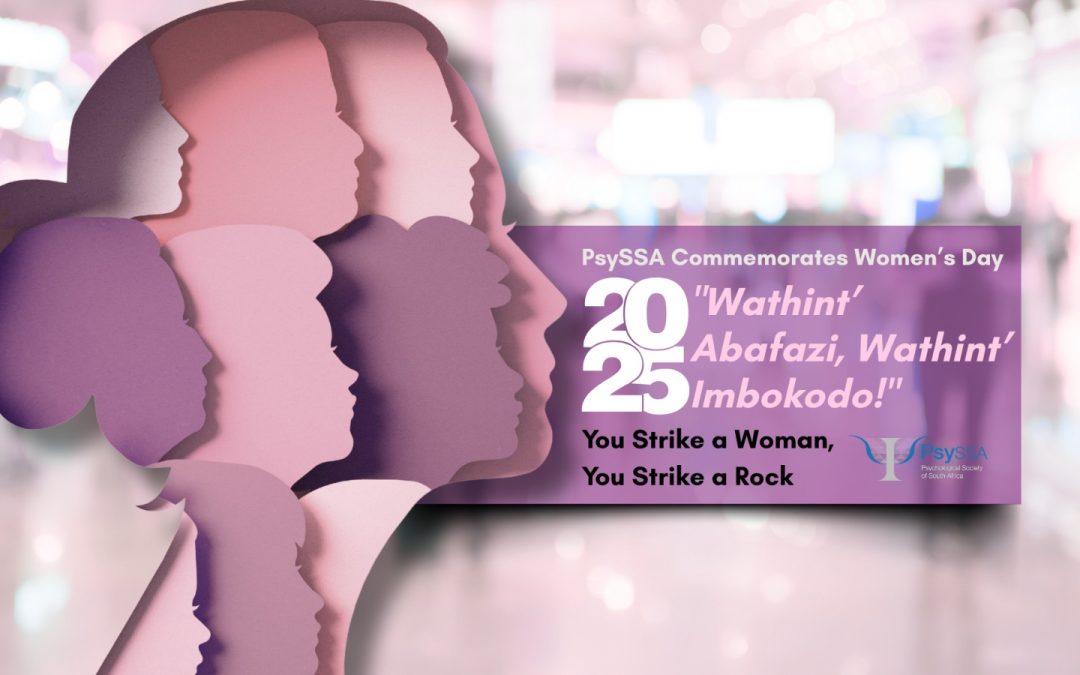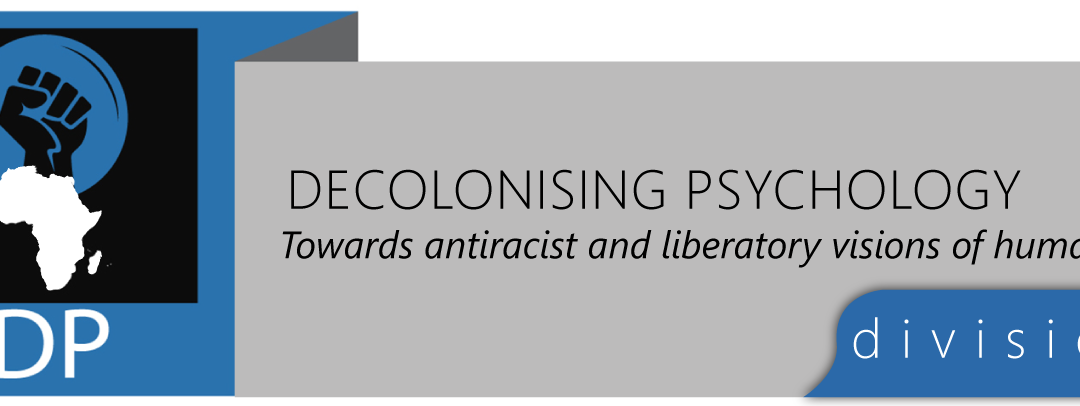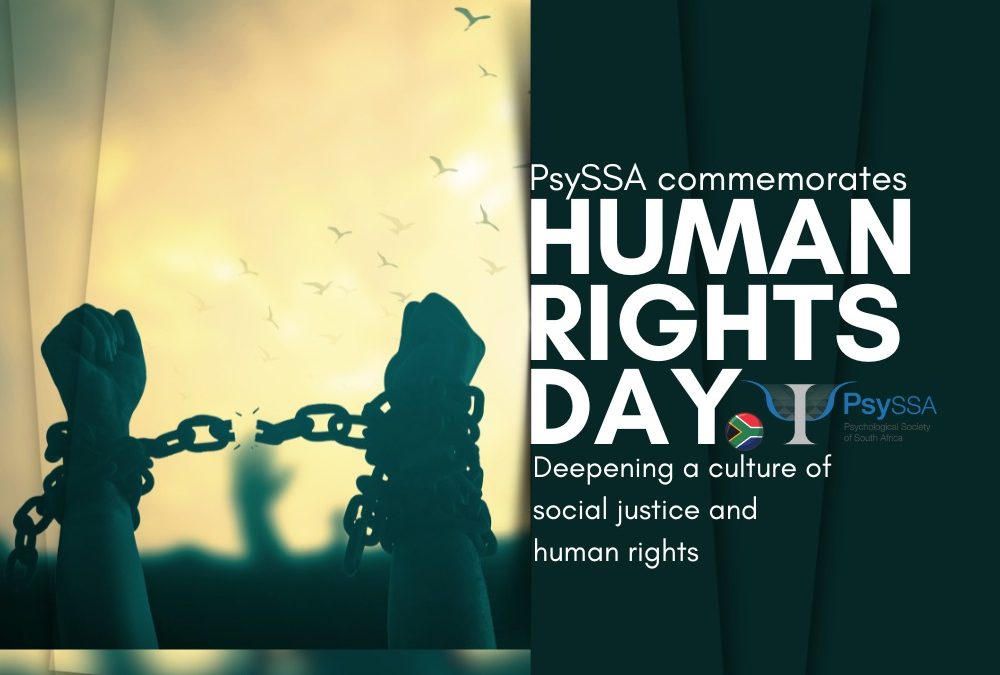A critical reflection on psychology’s role in advancing gender equity in South Africa
This opinion piece has been drafted by Angeline Stephens, PhD on behalf of the Sexuality and Gender Division (SGD) of PsySSA, with input from members of the SGD.
As we commemorate Women’s month in August and Women’s Day on the 9th August in South Africa, we reflect on psychology’s role in advancing gender equity and promoting socio-economic justice for women and gender diverse communities through inclusive psychological practice.
In marking this month and day, the South African government website begins by paying tribute to the women who marched to the Union Buildings on the 9th August, 1956, in protest against the Pass Laws (https://www.gov.za/WomensDay2025). Additionally and importantly, through remembering several “pioneer” women, we are reminded that women’s participation in the political transformation of our country and, specifically, in the fight for women’s rights, predates the significant 1956 march to the Union Buildings.
Accordingly, in reflecting on psychology’s role in advancing gender equity and promoting socio-economic justice for women in South Africa, we are compelled to situate psychology’s role within the broader political and socio-historical contexts of our beloved country; ravaged by the scars of the colonial rape[1] of the land and its people, apartheid violence and deep trauma.
Quijano’s (2007) concept of the coloniality of power in the “modern/colonial gender system” (Lugones, 2023) provides an appropriately relevant and critical point from which to reflect on the role that psychology plays, in the present moment, in addressing the gendered inequalities of the past, in ways that interrogate its intersections with race, class and sexuality.
To what extent has psychology shifted from being an instrument that supported an apartheid ideology and system of hierarchical racial categorisation and divisiveness to being one of inclusive practice that recognises the diversity of gendered, classed and raced identities?
Cognisant of this history that continues to permeate the lived reality of millions of women, whose lives are systematically devalued and dehumanised, in what ways does psychology advance gender equity and promote socio-economic justice for women and gender diverse communities through inclusive psychological practice?
It is appropriate to begin by considering the kind(s) of knowledge that is/are produced in academic and professional spaces through teaching, research, professional programmes and therapeutic work, as these enactments mark very tangible ways in which psychology, as a discipline and a practice, engages with (marginalised) communities and represents an instrument of power.
Psychology’s participation in teaching, research, training, therapy and community engagement offer powerful ways in which psychology can challenge and change normative, gendered ways of doing. But this requires constant critical reflexive practice of what we do.
It is pleasing to note that there is a shift towards including content that is more African-centred and produced in the global south in professional programmes. However, such content is often offered as an elective rather than one of the core modules. For a large part, western and eurocentric theoretical and therapeutic approaches continue to dominate professional programmes. The linkage between their inclusion and advancing gender equity becomes salient when we consider how psychology is done and enacted in work with women from marginalised communities in particular.
Access to resources and ownership of resources is highly gendered and raced in South Africa. The past apartheid system has meant that, for a long time, psychology has been dominated by white males from privileged socio-economic backgrounds. To what extent has this profile changed to represent a more inclusive and gender-diverse profession? And how has such change translated to empowering women from marginalised communities?
A quick survey of the selection of candidates for the professional Masters’ programmes in psychology across various HE institutions is likely to reveal a skew towards more women candidates. While this may be regarded as progressive, and a ‘good-fit’ given that more women than men tend to access psychological services, such changes may not be adequate in addressing gender equity if the programmes themselves remain primarily individualistic and westernised in their orientation.
Hence, it is pleasing to note the shift towards including more feminist, critical and decolonial perspectives in teaching, research and practice. The Hub for Decolonial Feminist Psychologies in Africa, housed at the Department of Psychology at the University of Cape Town, is a good example.
The Psychological Society of South Africa (PsySSA) itself has seen the emergence of additional Divisions based on membership interest, which, together with the more long-standing and established Divisions, reflect a shift towards more critical approaches to psychology and the communities it serves. More importantly, in terms of the gendered focus of this article, the PsySSA divisions offer practitioners a platform for more critical engagement with the changing landscape and its impact on gender and gender diversity.
The Sexuality and Gender, the Trauma and Violence, and, the Community and Social Psychology divisions, together with more recent additions such as the Decolonial Psychology and the Climate, Environment and Psychology divisions are good examples of how psychology can interrogate issues of gender and gender diversity from multiple, intersectional perspectives.
Being mindful of the power that psychology has, is important in how that power is acknowledged and shared in work with women and gender diverse people, especially people from marginalised communities, in ways that that recognise their power and agency through inclusive psychological practice. This means a move away from individualistic ways of doing, to ways that encourage collaboration and understanding in all areas of work, including community engagement and the therapeutic space.
The recent launch of the second edition of PsySSA’s Practice Guidelines for Psychology Professionals Working with Sexually and Gender-Diverse People marked a culmination of collaboration and dialogue between psychologists, academics and community-based advocates and NGOs working with sexually and gender-diverse people. It is an excellent example of how psychology, through collaboration and engagement with community stakeholders, has made a positive impact in advancing gender equity and the rights of sexually and gender-diverse people.
While this article does not specifically focus on the crisis of sexual and gender-based violence (SGBV), which is foregrounded in the 16 Days of Activism against Gender-Based Violence campaign in the months of November and December, SGBV remains a priority area that psychology has a role to play in working with women and other stakeholders to develop and implement interventions that seek to end violence.
Sexual and reproductive health rights (SRHR) marks another important priority area for women and sexually and gender-diverse people, especially from marginalised and impoverished communities. This priority area is one in which PsySSA and the Sexuality and Gender Division (SGD) have begun engaging in with the intention to make a meaningful contribution to addressing gender equity and socio-economic justice for women and sexually and gender-diverse people within a rights-based framework.
Increasingly, psychology in South Africa has opened up the spaces for the voices of (marginalised) women to be heard, valued and appreciated through ethical and collaborative research practices and engagements. Their stories of their lived experiences form an integral component in shared knowledge creation. Working with women who share their stories to advance gender equity represents a highly empowering and inclusive practice for women and psychology practitioners.
Psychology has played an important role in challenging attitudes, perceptions and behaviour that perpetuates gender oppression. However, gender cannot be regarded as a stand-alone social category. Psychology needs to adopt a more critical stance that recognises the intersections of gender with other social categories. For example, the inclusion of women with disabilities sadly remain a peripheral afterthought in many programmes and interventions that target women.
The intersections of gender with race and class remain critical when thinking about psychology’s role in promoting socio-economic justice for women and gender-diverse communities as their vulnerability is often heightened. The release and sharing of (psychology’s) power in such contexts is a necessary requirement for work that seeks to recognise agency, heal and build resilience.
The question of psychology’s role in advancing gender equity, promoting socio-economic justice for women and gender diverse communities through inclusive psychological practice, remains a critical question of relevance that we, as ethical practitioners, must engage with on an ongoing basis.
Ultimately, advancing gender equity and promoting socio-economic justice for women and gender diverse communities is about recognising women and gender diverse communities as human – and not “less than human” (Quijano, 2007). This should be a central and foundational principle that underpins psychology’s work with women.
And finally, it is worth pointing out that while we have spoken about ‘psychology’ as a discipline and a practice, psychology does not exist in a separate realm from us. We make up ‘psychology’. We all have a collective and ethical responsibility to work in ways that advance gender equity and promote socio-economic justice for women through collaborative work with women, communities, and other stakeholders such as educators and policy makers.
[1] We acknowledge that the word “rape” may be triggering for people who have experienced sexual violence, and its use in an article with a gendered focus may be viewed as being contentious. However, the word is used to convey the brutality and violence of coloniality, what it took without consent, and specifically, its continued trauma in the lives of the people, especially women, that it violated.











